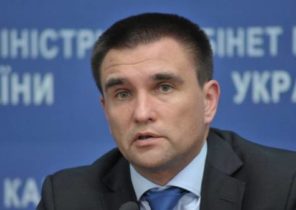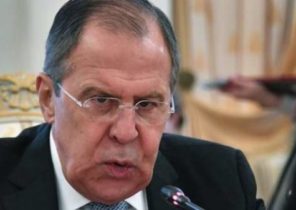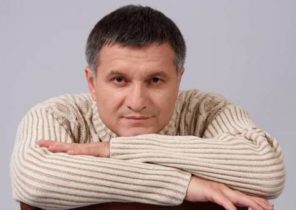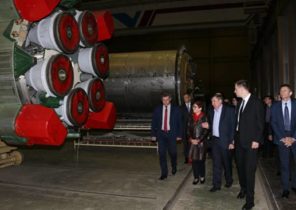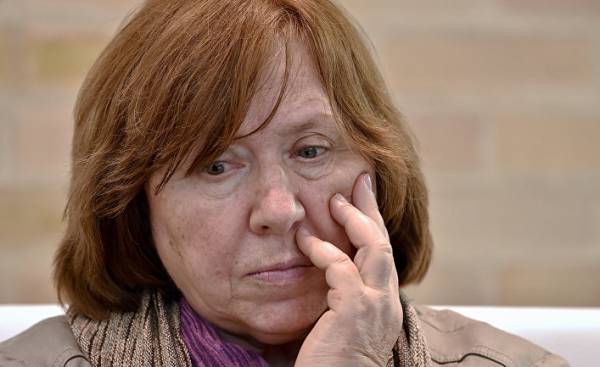
When talking with Svetlana Aleksievich, immediately understand that she is much more comfortable to listen than to speak. This is not surprising: a Belarusian writer has spent many decades listening to. Aleksievich, who is now 69 years, has recorded thousands of hours of conversations on tape with the residents of the former Soviet Union, collecting and comparing the life stories of ordinary people. She wove these stories in an elegant book with such power and force of insight that in 2015 became the laureate of the Nobel prize for literature.
In Russia today, the creativity of the author — as a Rorschach test for political attitudes: among the oppressed the liberal opposition it is considered to be the conscience of the nation, uniquely insightful commentator, explaining the frustration and complexity of post-Soviet life. The broader community considers her a traitor, which in my books damaging to the image of Russia and Russians.
When we met with her in her hometown of Minsk in the cosy cellar café, the entrance to which was located in the bas-reliefs of impressive buildings from the end of the Soviet era, the author just returned from a tour in South Korea and was going to go to Moscow. “Very tiring, when you’re the centre of attention; I want to retire and start again full to write,” she says, visibly tired from the journey and emphasis. The author reluctantly agreed to talk about the book, which was written more than three decades ago, “war has no female face”, republished in a new English translation in July this year. The book was written in the early 1980-ies, for a long time the writer could not find her a publisher, but during the reappraisal of the late Soviet period of perestroika, she became in tune with the spirit of the times, reflection and critical rethinking of the past and was printed with a circulation of 2 million copies and brought the author wide fame. In the future, ruthless light that spilled Aleksievich on Soviet military experience, no longer welcome in Russia. Since awarding the writer the Nobel prize, her work gained a new international audience, giving the author another portion of fame 30 years after its first glimpse.
Initially in writing this book the author gave the article that she read in the local Minsk newspaper in the 1970-ies, about how at a local factory celebrated the retirement of the accountant, the sniper-veteran, killed 75 of the Germans during the great Patriotic war. After that first interview, she began looking for other women veterans across the Soviet Union. A million Soviet women served at the front, but were not included in the official military history. “Until this book, only heroines in our military literature was the nurses who saved the life of some heroic Lieutenant,’ she says. But these women are plunged in the mud of war as deeply as men”.
The author admits that it was difficult to talk to these women to stop them, one way to repeat memorized platitudes about the war. A shy reality of their war memories. “They said, “Okay, we’ll tell you, but you should write it then differently, in a more heroic vein””. After one candid interview with a woman who worked in the military as a medical assistant in a tank battalion, says the author, it is, as promised, sent that transcript of conversation by mail, and received in return a parcel full of newspaper clippings about the military exploits, and most of the interviews were just crossed out with a pen.
“Then I have repeatedly encountered with the way the two these truths coexist in the same person, says the author. — Someone’s personal truth, downtrodden somewhere in the dungeon, really common, spirit-filled time.”
The book the author touches on topics considered in the Soviet era taboos and re-cut today from the history of Putin’s Russia: the Molotov-Ribbentrop Pact in which Stalin and Hitler divided Europe, torture deserters, psychological consequences of war, stretching for many, many years. Her scenes resemble a nightmare from which people Wake up in a cold sweat, they make you shudder, remembering how they lacked patience as they could not see the forest, not thinking about thrown in shallow graves bodies.
In modern Russia, Putin has turned the victory in the great Patriotic war in the national Foundation of almost religious importance, so any questions to black-and-white version of the story of the glorious victory are equated with heresy. More important today are the testimonies of the women in the books Aleksievich, most of whom have already died. In the book short of heroism; heroic deeds, bravery and heavy burden which rests on the shoulders of these women Shine through on every page. But the nightmares of war, it does not erase from this story. As a result, the book becomes much more impressive testimony to the incredible price that the Soviet people had to pay to defeat Nazi Germany than the Intercontinental missiles displayed in red square on Victory Day may 9, or the endless blockbuster movies about the war, broadcast on Russian television.
After the book “war has no female face” the author wrote the book, where mentioned about the nuclear disaster in Chernobyl and the Soviet invasion of Afghanistan,about the two tragedies that became the death throes of the Soviet Union, they would both was and causes and symptoms of the impending collapse of the Empire.
Recently the author has published a huge book “Time second hand”, a Requiem for the Soviet time. It presents the chronicle of the shocking existential void, which was characteristic of the 1990-ies after the collapse of the Soviet Union, it helps to understand the appeal of Putin’s promises to restore the former pride wounded post-Imperial nation.
“No one believed that the Soviet Union would collapse, it was a shock,” says the author. Everyone had to adapt to a new painful reality, and the rules, codes of conduct and everyday language of the Soviet experience disappeared almost overnight. All together Alexievich’s books remain probably the single most impressive document of the era of the end of the Soviet Union and consequences of its collapse. The author became a tough critic of Alyaksandr Lukashenka, the authoritarian President of newly independent Belarus. The writer left the country “in protest” after spending 11 years in exile in various European countries and returned home only a few years ago. “When you stand on the barricades, everything you see turns into a goal, you stop seeing the person and the writer should understand that. From the point of view of art the butcher and the victim are equal because they are human. Need to see people,” she said.
Lukashenko has let know that is not a fan of the author, and although the Nobel prize did provide some security, her books were not published in Belarus. She actually denied the right to public performances. As a writer with the Ukrainian and Belarusian heritage but writing mostly about the post-Soviet space in General, the author is not sure about his attitude to modern Russia. She doesn’t know whether to classify themselves to the Russians or to talk about them in the third person. Much more clearly it defines its attitude to Putin and the current political climate. “We thought that we would keep communism in the past, and all will be well. But it turns out that it is impossible to forget about him and just be free, because these people do not understand what freedom is,” she says.
Aleksievich has repeatedly criticized against the annexation of Crimea and its interference in Eastern Ukraine that led to a break with many of her Russian friends, she said. She never knows how the rest of her conversation, when she arrives in Moscow. She recalled how recently came to visit an old friend: “I barely came in and took off her coat, she sat me down and said, “Sveta, let’s put points over i, the Crimea is not ours.” It is a kind of password! I replied, “Thank God””.
During his visit to Moscow she performed at the Gogol center, the vanguard theatre space, known for his sharp statements to the Director and controversial productions. The lecture develops on various topics, sometimes loosely connected, but the audience accepts it, applauding vigorously, showing thus his liberalism and contempt for Putin’s militarism. These questions, raised in her works cause the most resonance.
Soon after, she gives an interview to the Russian news Agency. This time the questions are rude and provocative, excited the author suggests that now she understands the motives for the murder of a Pro-Russian journalist in Kiev, she is clearly uncomfortable, she kept insecure. Russian Internet explodes with a storm of discussions in connection with this scandal.
The writer is currently working on two projects that she wants to finish: one about love, here she looks 100 relations from the point of view of the participating men and women, and the second book is about the process of aging. It’s her reflections on the eve of the 70-th birthday.
“In youth we almost don’t think about it, and suddenly experiencing these issues,” she says. A little over an hour after the beginning of our conversation, her quiet voice becomes almost inaudible, it seems that she was tired and was distracted. “What is the meaning of life, why did all this happen?” — asks she.
Not wanting to abuse her kindness, I turn off my tape recorder, thank the writer for the interview, believing that she will immediately rush to the exit. “Well, she says, and her face immediately blossom. — Maybe get some lunch?” I was surprised to stay, and we talk for another hour. Now the questions she asks: what do I think about Russia, about Donald trump, on the European far right and the Queen. As soon as the author is a student, it is much easier to ask questions than to answer them.

